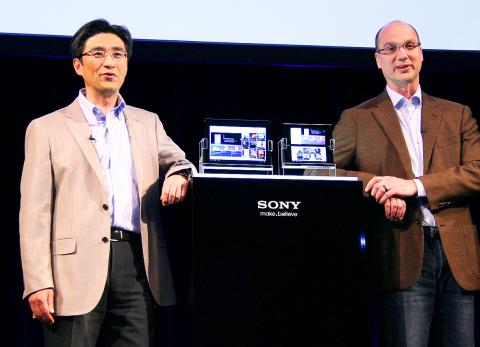Sony launched its first tablet computers in an ambitious attempt to grab the second spot in the market more than a year after Apple’s iPad revolutionized mobile computing.
The gadgets will use an operating system based on Google’s Android 3.0, said Kunimasa Suzuki, deputy president of the consumer products and services group.
These will be the first tablets to enable the use of PlayStation games, said Suzuki, who produced one of the glossy black devices from his jacket pocket during a media launch yesterday.

Photo: Bloomberg
Suzuki raised eyebrows in January when he told reporters at the Consumer Electronics Show in Las Vegas that Sony was aiming for the No. 2 spot in the tablet market within a year even though it had yet to put a product on the market.
“That effectively means they have to beat Samsung, which is a very tough rival,” said Nobuo Kurahashi, an analyst at Mizuho Investors Securities in Tokyo. “Although this is an interesting product, they have already been left behind in televisions, so it’s not going to be easy.”
Kazuo Hirai, seen as a likely successor to chief executive Howard Stringer, made his first public appearance yesterday since the gaming division chief was promoted to the No. 2 position last month.
Sales of tablet devices are expected to quadruple to about 294 million units between this year and 2015, with almost half that Android-based, research firm Gartner has forecast.
Sony’s tablets, codenamed S1 and S2, are WiFi and 3G/4G compatible. The S1 has a 9.4-inch display and is designed to make it easier to hold for long periods of time, Sony said. The S2 has two 5.5-inch displays in a clamshell design.
The company, which had been criticized for failing to come up with a tablet offering after iPad’s launch in April last year, has emphasized the need to differentiate its tablet from rivals, even if that takes time.
“Although it’s a late-comer in the market, it has potential as what you need is just one big uniqueness that can sell to customers be it design or whatever,” said Lee Sun-tae, an analyst at Meritz Securities in Seoul.
In a bid to tap burgeoning demand, competitors including Samsung Electronics — whose Galaxy Tab is Apple’s strongest competitor in the tablet market — and Motorola, LG Electronics and HTC are flooding the market with tablets running Android.
Shares in Sony, which unveils its quarterly results on May 26, fell 2.1 percent yesterday.

CAUTIOUS RECOVERY: While the manufacturing sector returned to growth amid the US-China trade truce, firms remain wary as uncertainty clouds the outlook, the CIER said The local manufacturing sector returned to expansion last month, as the official purchasing managers’ index (PMI) rose 2.1 points to 51.0, driven by a temporary easing in US-China trade tensions, the Chung-Hua Institution for Economic Research (CIER, 中華經濟研究院) said yesterday. The PMI gauges the health of the manufacturing industry, with readings above 50 indicating expansion and those below 50 signaling contraction. “Firms are not as pessimistic as they were in April, but they remain far from optimistic,” CIER president Lien Hsien-ming (連賢明) said at a news conference. The full impact of US tariff decisions is unlikely to become clear until later this month

With an approval rating of just two percent, Peruvian President Dina Boluarte might be the world’s most unpopular leader, according to pollsters. Protests greeted her rise to power 29 months ago, and have marked her entire term — joined by assorted scandals, investigations, controversies and a surge in gang violence. The 63-year-old is the target of a dozen probes, including for her alleged failure to declare gifts of luxury jewels and watches, a scandal inevitably dubbed “Rolexgate.” She is also under the microscope for a two-week undeclared absence for nose surgery — which she insists was medical, not cosmetic — and is

GROWING CONCERN: Some senior Trump administration officials opposed the UAE expansion over fears that another TSMC project could jeopardize its US investment Taiwan Semiconductor Manufacturing Co (TSMC, 台積電) is evaluating building an advanced production facility in the United Arab Emirates (UAE) and has discussed the possibility with officials in US President Donald Trump’s administration, people familiar with the matter said, in a potentially major bet on the Middle East that would only come to fruition with Washington’s approval. The company has had multiple meetings in the past few months with US Special Envoy to the Middle East Steve Witkoff and officials from MGX, an influential investment vehicle overseen by the UAE president’s brother, the people said. The conversations are a continuation of talks that

Alchip Technologies Ltd (世芯), an application-specific integrated circuit (ASIC) designer specializing in artificial-intelligence (AI) chips, yesterday said that small-volume production of 3-nanometer (nm) chips for a key customer is on track to start by the end of this year, dismissing speculation about delays in producing advanced chips. As Alchip is transitioning from 7-nanometer and 5-nanometer process technology to 3 nanometers, investors and shareholders have been closely monitoring whether the company is navigating through such transition smoothly. “We are proceeding well in [building] this generation [of chips]. It appears to me that no revision will be required. We have achieved success in designing